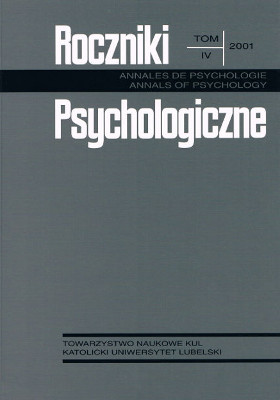Universal Theory of Reasoning?
Abstract
This paper deals with the problem of the so-called universal reasoning theory. First it presents two theories that claim to be universal in describing reasoning. Both are built on the algorithmic level what means that they have to specify the nature of mental symbols and the processes that operate upon them. The protagonists of the historically first theory, the mental rule theory, claim that reasoning requires building mental proofs for given arguments. Such proofs are syntactic in nature, and their steps resemble the use of rules known from courses on formal logic. The protagonists of the second theory say that reasoning consists of building mental models (hence the name: mental model theory) that correspond to different possibilities that may happen given the truth of the premises. Both theories seem to account for reasoning processes on the universal level, and yet this claim is too broad for both of them. As noted by Roberts (1993) both theories omit the problem of individual differences. However, the study of individual differences might shed a new light on the rules vs. model debate and provide important new data on the reasoning processes described on both algorithmic and higher levels (e. g. Anderson's rational level).
References
Baddeley, A. (1986). Working memory. Oxford: Oxford University Press.
Braine, M. D. (1994). Mental logic and how to discover it. [W:] J. Macnamara, E. R. Gonzalo (red.), The logical foundations of cognition. New York: Oxford University Press.
Braine, M. D., O'Brien, D. P. (1991). A theory of if: Lexical entry, reasoning program and pragmatic principles. Psychological Review, 98, 182-203.
Brzeziński, J. (1996). Metodologia badań psychologicznych. Warszawa: PWN.
Brzeziński, J., Stachowski, R. (1984). Zastosowanie analizy wariancji w eksperymentalnych badaniach psychologicznych. Warszawa: PWN.
Chlewiński, Z. (1999). Modele umysłu. Warszawa: PWN.
Churchland, P. M. (1988). Matter and consciousness. Cambridge, MA: MIT Press.
Cohen, J. (1981). Can human irrationality be experimentally demonstrated? Behavioral and Brain Sciences, 4, 317-370.
Evans, J. St. (1991). Theories of human reasoning: the fragmented state of the art. Theory and psychology, 1, 83-105.
Evans, J. St. (1993). The cognitive psychology of reasoning: an introduction. Quarterly Journal of Experimental Psychology, 46A, 561-567.
Evans, J. St., Newstead, S. E., Byrne, R. M. (1993). Human reasoning: The psychology of deduction. Hove: Erlbaum.
Falmagne, R. J., Gonsalves, J. (1995). Deductive inference. Annual Review of Psychology, 46, 525-559.
Geis, M. C., Zwicky, A. M. (1971). On invited inferences. Linguistic Inquiry, 2, 561-566.
Gigerenzer, G., Murray, D. J. (1987). Cognition as intuitive statistics. Hillsdale, NY: Erlbaum.
Girotto, V. (1994). Is the model theory of induction also a theory of inductive reasoning? International Studies in Philosophy of Science, 8, 41-43.
Henle, M. (1962). On the relation between logic and thinking. Psychological Review, 69, 366-378.
Jaśkowski, S. (1934). On the rules of suppositions in formal logic. Studia Logica, 1, 5-32.
Johnson-Laird, P. N. (1983). Mental models. Toward a cognitive science of language, inference, and consciousness. Cambridge, MA: Cambridge University Press.
Johnson-Laird, P. N. (1993). The computer and the mind. London: Fontana Press.
Johnson-Laird, P. N., Bara, B (1984). Syllogistic inference. Cognition, 16, 1-62.
Johnson-Laird, P. N., Byrne, R. M. (1991). Deduction. Hillsdale, NJ: Erlbaum.
Johnson-Laird, P. N., Byrne, R. M., Schaeken, W. (1992). Propositional reasoning by model. Psychological Review, 99, 418-439.
Johnson-Laird, P. N., Savary, F. (1996). Illusory inference about probabilities. Acta Psychologica, 93, 69-90.
Kirby, K. N. (1994). Probabilities and utilities of fictional outcomes in Wason's four-card selection task. Cognition, 51, 1-28.
Kosslyn, S. M. (1980). Image and mind. Cambridge, MA: Harvard University Press.
Marr, D. (1982). Vision: A computational investigation into the human representation and processing of visual information. San Francisco: Freeman.
Najder, K. (1989). Reprezentacje i ich reprezentacje. Wrocław: Ossolineum.
Newell, A. (1980). Physical symbol systems. Cognitive Science, 4, 135-183.
Nosal, Cz. (1990). Psychologiczne modele umysłu. Warszawa: PWN.
Oaksford, M., Chater, N. (1992). Bounded rationality in taking risks and drawing inferences. Theory and Psychology, 2, 225-230.
Piaget, J. (1953). Logic and psychology. Manchester: Manchester University Press.
Pylyshyn, Z. (1984). Computation and cognition. Cambridge, MA: MIT Press.
Rips, L. J. (1983). Cognitive processes in propositional reasoning. Psychological Review, 90, 38-71.
Rips, L. J. (1989). The psychology of knights and knaves. Cognition, 31, 85-116.
Rips, L. J. (1990). Reasoning. Annual Review of Psychology, 41, 321-353.
Rips, L. J. (1994). The psychology of proof: Deductive reasoning in human thinking. Cambridge, MA: MIT Press.
Roberts, M. J. (1993). Human reasoning: Deduction rules or mental models, or both? Quarterly Journal of Experimental Psychology, 46A, 569-589.
Roberts, M. J. (1999). Strategies in relational inference. W: A. Vandierendonck, M. Brysbaert, K. van der Goten (red.), Preceedings of the XI Conference of the European Society for Cognitive Psychology (s. 96). Ghent: ESCoP / Academia Press.
Schaeken, W., de Vooght, G., Vandierendonck, A., d'Ydewalle, G. (red.) (2000). Deductive reasoning and strategies. Mahvah, NJ: Erlbaum.
Schaeken, W., Johnson-Laird, P. N., d'Ydewalle, G. (1996). Mental models and temporal reasoning. Cognition, 60, 205-234.
Stanowich, K. E., West, R. F. (2000). Individual differences in reasoning: Implications for the rationality debate. Behavioral and Brain Sciences, 23, 645-726.
Sternberg, R. J. (red.) (1982). Handbook of human intelligence. Cambridge: Cambridge University Press.
Van der Henst, J.-B., Yang, Y., Johnson-Laird, P. N. (2001). Strategies in sentential reasoning. (maszynopis złożony do druku).
Wason, P. C. (1966). Reasoning. W: B. M. Foss (red.), New horizons in psychology. Harmondsworth: Penguin.
Woodworth, R. S. (1938). Experimental psychology. New York: Holt.
Copyright (c) 2001 Roczniki Psychologiczne

This work is licensed under a Creative Commons Attribution-NonCommercial-NoDerivatives 4.0 International License.


